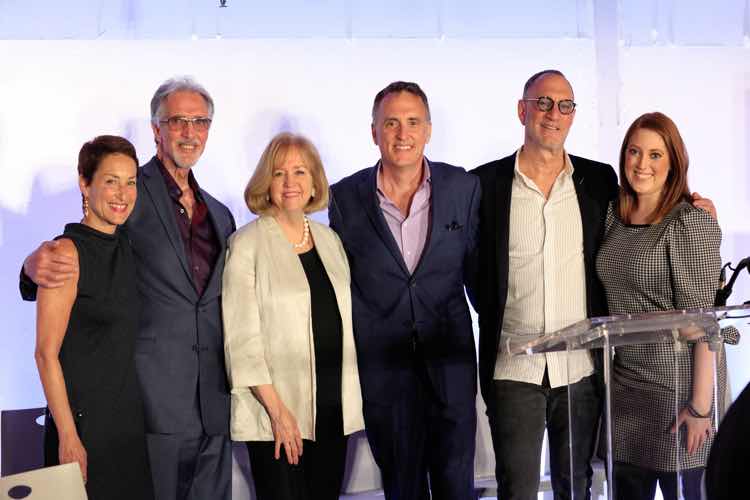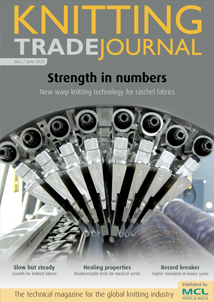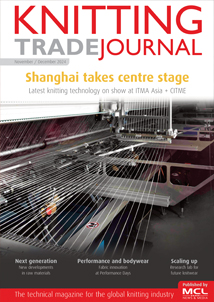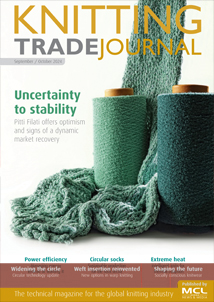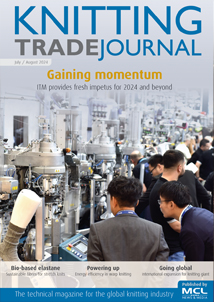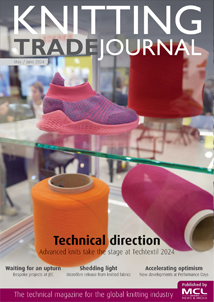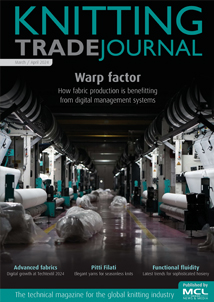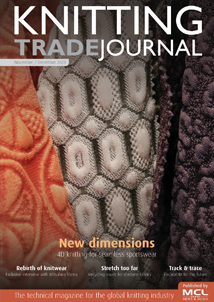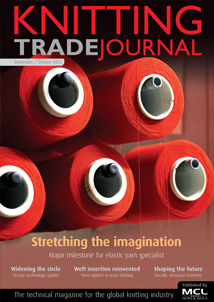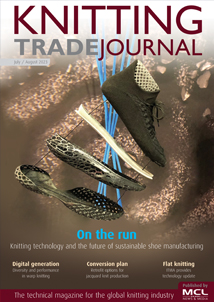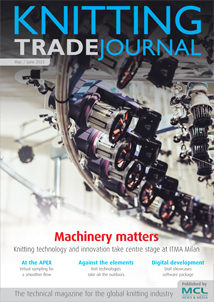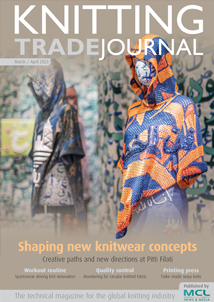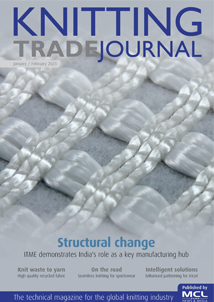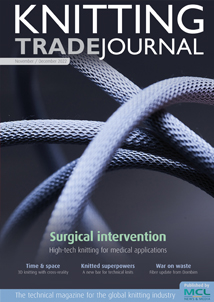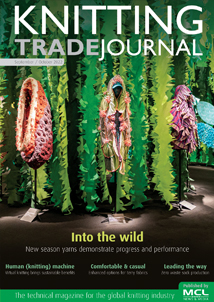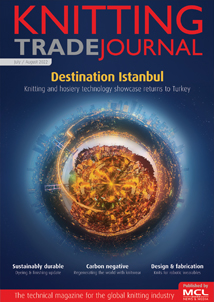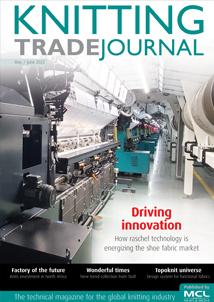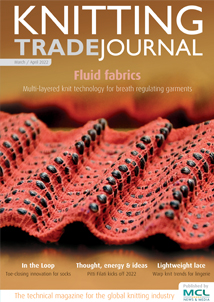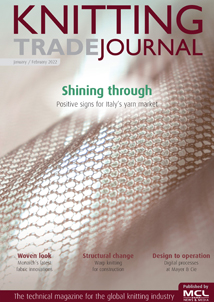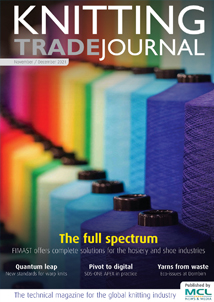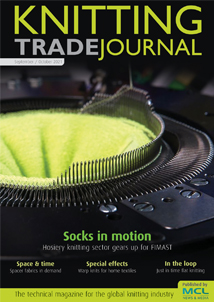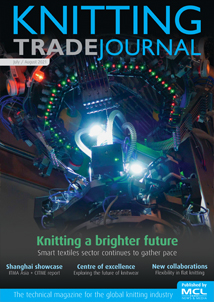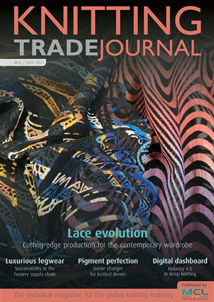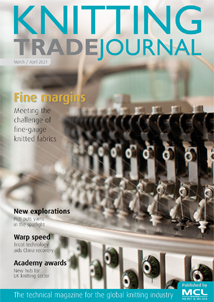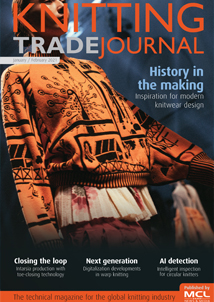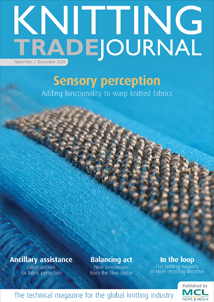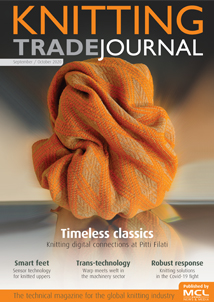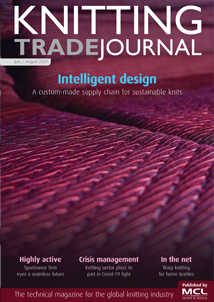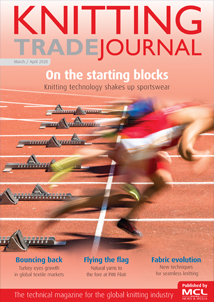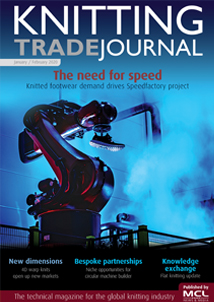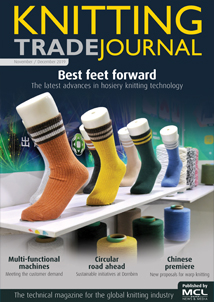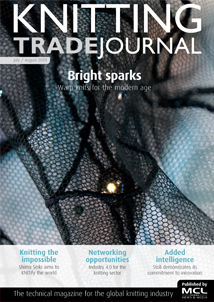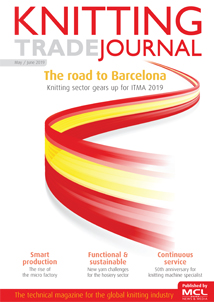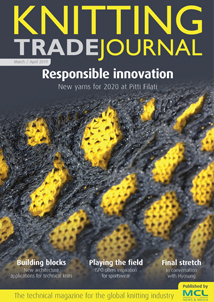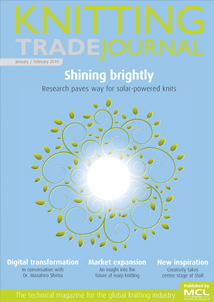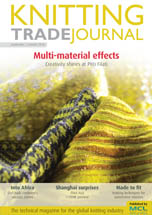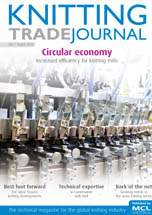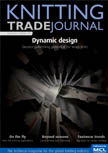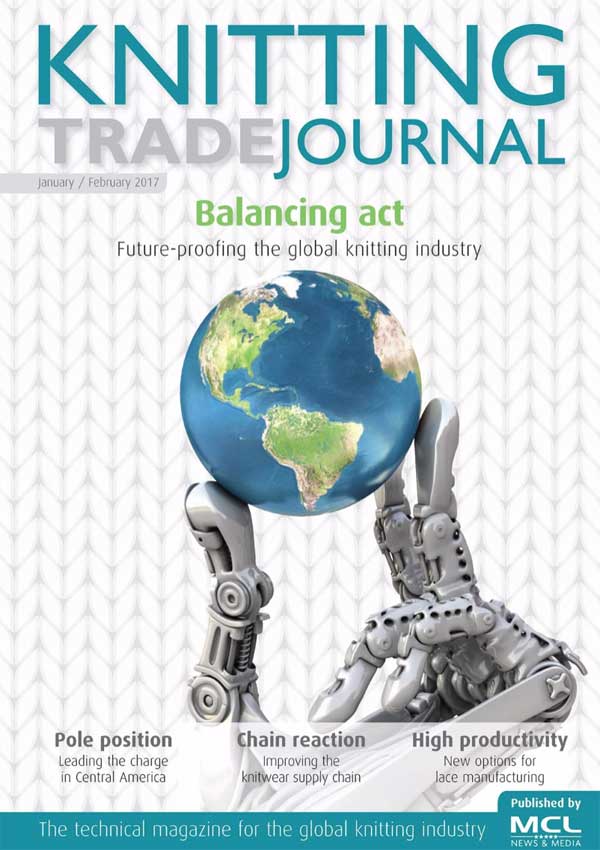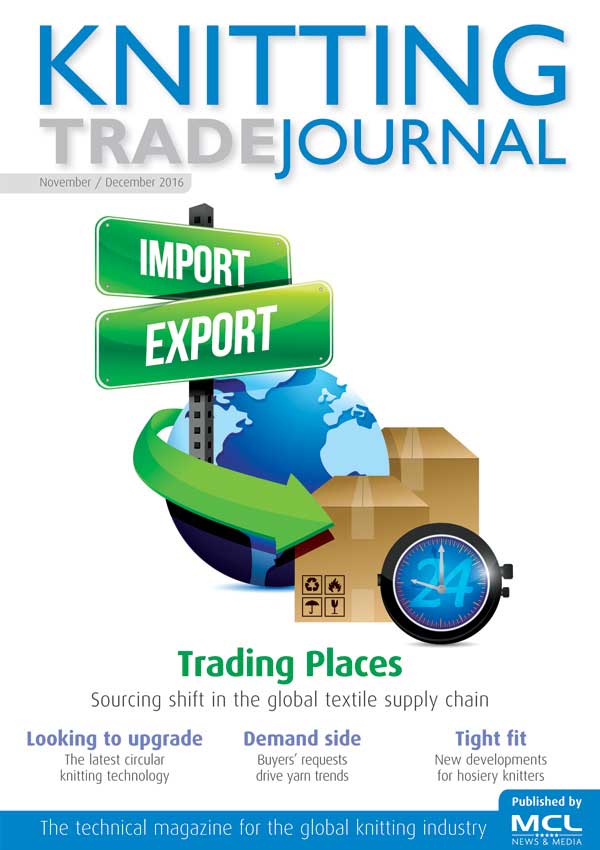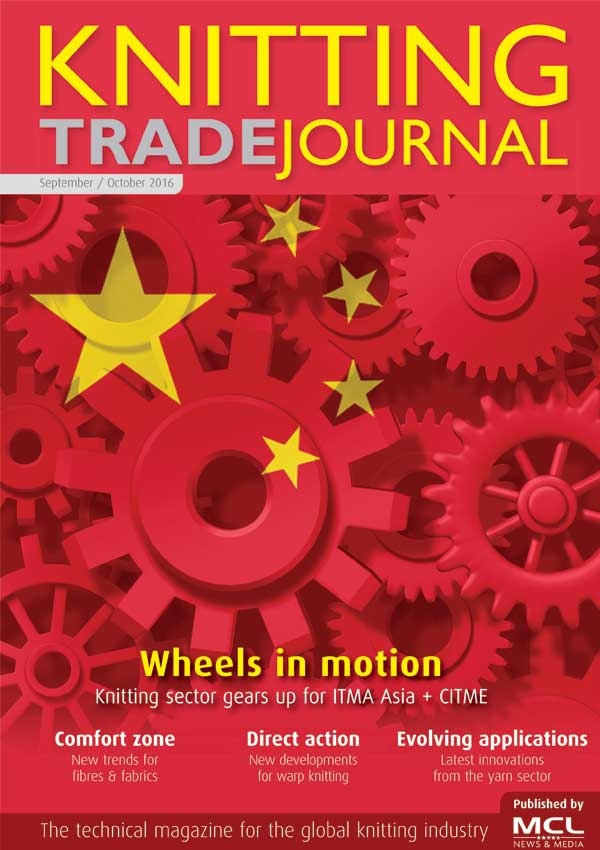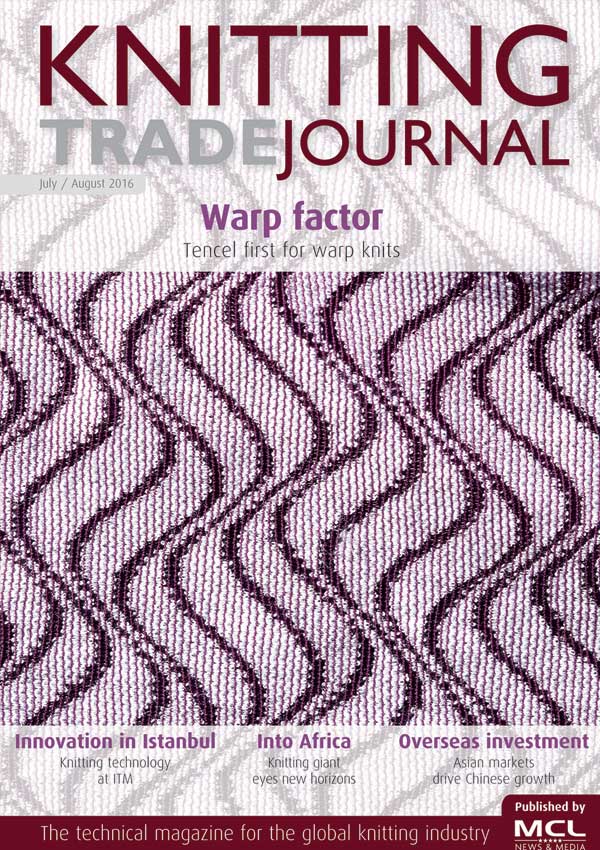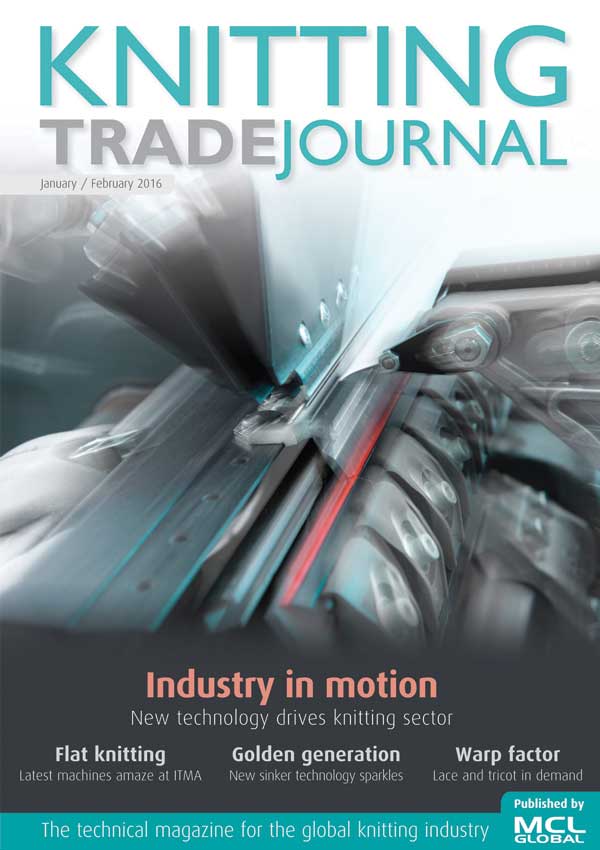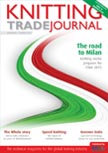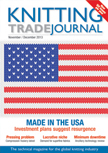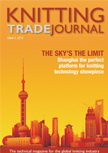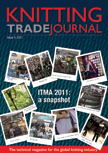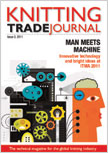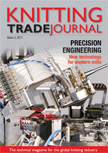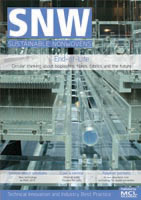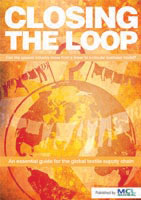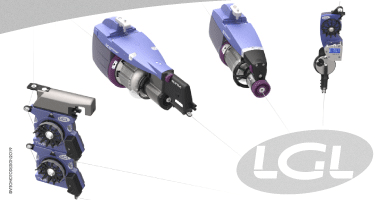John Elmuccio, co-founder of Evolution St. Louis, tells Haydn Davis about the company's journey towards creating the flat knitting supply chain of the future.
As we rattle over the points of life, it's always an interesting exercise to try and pinpoint those particular moments when business, adventure and career choices were made. For some of us, identifying that moment in time can be difficult, our memories clouded by years of decision and, in some cases, indecision making.
For John Elmuccio, co-founder of Evolution St. Louis, this is not a problem. Easing into our stools in the hospitality area of the Stoll booth during ITMA Barcelona, John instantly recollects the moment, seven years ago, he realised that his path lay in the creation of a high-tech manufacturing facility in the United States.
"It was an epiphany," John reminisces, recounting how a career path as a renowned designer, buyer, salesman and brand owner in the apparel sector, had led him to a hotel room, in China, at one o'clock in the morning, deliberating over whether to pay US$1.35 or $1.38 for two garments on the same hanger for a major retailer back in Europe.
"My work at the time had evolved into a consultancy, helping major brands transition from domestic manufacturing and shifting their supply chains," John says. "I sat there, at 1am, agonizing over a few cents - and I just thought to myself, 'what am I doing? It’s no longer about the product, everything now is just about price'."
As a result, John embarked on a journey, with his partner, Jon Lewis, on a road that took them from New York's garment district, via Detroit, to the creation of a state of the art flat-bed knitting facility in the Grand Center Arts District of St Louis, Missouri, and the 'supply chain of the future'.
"I had that passion for design and I cared about the product," he says thoughtfully. "To have come as far as I did and still to be fixating on price wasn't right. I made a conscious decision at that moment about what I wanted to do. My partner Jon Lewis and I started a licensing company in the US for high end brands in the swimwear and lingerie categories. Interestingly enough, two years in, we were noticing a dramatic shift in the retail environment. Many retailers were struggling and companies didn't know how to deal with the growing demand of an online presence."
Millennial
Most of the innovation, John and his partner noticed, was coming out of millennial brands - which were linking directly to the consumer. "The traditional brands were becoming staid and we saw the opportunity. We invested in a young millennial brand and started to look for additional opportunities. The more conversations we had and the more we looked at their business models, we realised that the old strategy of 'I must sell to the largest retailer' had become a failed principle in today's market place.
"We really started to take a close look at the supply chain that was supporting those emerging brands and recognized that the 12-18 month supply chain concept does not work for today's shoppers who are looking to buy with their fingers on a touchscreen."
John also looked at how the struggling brands and retailers were just simply trying to modify their existing supply chains to compete in this new, fast moving marketplace, rather than exploring the new methods. "That was the wrong approach," he says, with more than a hint of experience. "The old model had to be thrown away."
As we discuss the ideas that followed, it's not lost on me that we sit, surrounded by some of the most state-of-the-art knitting technology available on the market. For John, it was the realization about just what these machines are capable of, that helped him formulate his plans.
"I made a conscious decision to erase my memory and try and think about how we are going to service these brands," he says. "Retail, we realised, had changed forever and the fact that there is so much happening online meant the whole supply chain needed to be more responsive and, most crucially, address demand rather than project demand. The 12-18 month supply chain cycle, from design to delivery, clearly had to go."
Here though, John makes a key point; that this is not about reshoring.
Isn't it? "I reject the concept of reshoring," says John firmly. "We don't believe that we can bring the apparel industry jobs back to the US en masse. This project is about building the new supply chain with the technology that is available. We looked at the cut & sew sector, which is still very labour intensive, and the cost of labour in the US just wasn't going to support that model.
 "We looked at the Stoll flat-bed knitting technology - the latest CMS and ADF models - and we understood that this was the way to go. Knitting had become feasible for developing the type of supply chain that was required."
"We looked at the Stoll flat-bed knitting technology - the latest CMS and ADF models - and we understood that this was the way to go. Knitting had become feasible for developing the type of supply chain that was required."
They had the how, but next, they needed the where. "We had to look at building facilities in the US," explains John, outlining how, after considering New York City and Detroit, the pair settled on St Louis.
The cost of real estate in the traditional apparel center of New York's Garment District was prohibitive
and, with Detroit under serious consideration at this point, a conversation over a cup of coffee with one
of their brand owners, led the pair to St Louis.
The contact led them to a meeting with Susan Sherman, co-founder of the Saint Louis Fashion Fund who, John says, was doing great things to reignite the apparel sector in the city, a region that already had an historical affiliation to the industry. "Through Susan's endeavor, of brining back designers to the city, she knew that if St Louis was going to recapture its heritage, it also needed to bring back manufacturing," he says. "She was enamored with our whole idea and, importantly, understood the concepts we were
working towards."
Meetings with city officials, development organisations and potential investors followed and after numerous discussions and a full explanation of what the knitting technology was capable of, the decision was made.
"Now, all of a sudden we had the tech and all the other key metrics began to fall into place," says John. "It was a no brainer for us."
The result is a 32,000 square foot state of the art facility in the Grand Center Arts District of St Louis which will take its first delivery of the latest generation Stoll CMS and ADF flat knitting machines in September, followed by a full production startup in the fourth quarter.
Hi-tech
Remarkably, the artist impression of the site depicts a knitting facility unlike anything this correspondent has ever seen. The 3D modeling of the facility shows bright, open office spaces, glass walls, rest areas and coffee bars; a space more akin to a modern-day tech start-up rather than a knitting mill.
"One of our investors purchased the building and is leasing it back to us over 30 years," John explains. "This is the supply chain of the future. We wanted to build it as if it was a tech company, to create an environment for young workers who want to work in those types of surroundings."
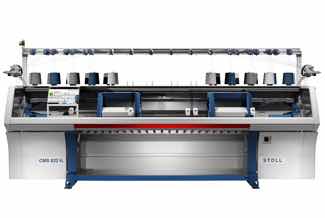 Total capacity at the site is 90 machines and Evolution St Louis will begin with 30, ready at a moment's notice to add new models as demand requires. "We have a range of the latest CMS and ADF technologies in a range of gauges," says John, adding that each will be equipped with Stoll's latest knitelligence software.
Total capacity at the site is 90 machines and Evolution St Louis will begin with 30, ready at a moment's notice to add new models as demand requires. "We have a range of the latest CMS and ADF technologies in a range of gauges," says John, adding that each will be equipped with Stoll's latest knitelligence software.
"Everything we're buying is the latest Stoll has to offer. We also have a tremendous collaboration in terms of training and support. They have really been a great partner in this project. We believe in the Stoll technology and a lot of the people we spoke to also felt very strongly about it. They are as invested as we are in this broader vision of an industry epicentre."
At the moment, Evolution St Louis does not plan to launch its own brand, but is certainly well placed to serve the more traditional labels as well as the quickly evolving millennial brands appearing across the marketplace. "We know a lot of people in the industry," says John, explaining how one of the company's key investors and Board Member is a a gentleman by the name of Gary Wassner, the owner of the Hilldun Corp, a finance company which finances more than 400 brands across the US. Throw in his status as a
cast member of the Project Runway reality TV show and you can see the advantages of having one of
the top three influential people in the US apparel industry on board.
"We have the ability to have outreach to the biggest and best brands in the country," John says confidently. "Since our initial announcement, some of the most prominent brands in the industry have been in touch and they are very excited about manufacturing in the US. They are addressing some of the same issues; trying to react to demand as quickly as possible."
Of course, like any new business, the plan is not without its trials and John admits that there are still some hurdles to overcome. "One of the biggest challenges," he suggests, "is educating designers to understand everything the Stoll machines are capable of making. Training machine programmers is covered through our collaboration with Stoll, and they have offered fantastic support for that. I’ve told designers that as far as the tech was concerned, they were only limited by their imagination, but it wasn't until I took a few of them to the Stoll showroom in New York and they saw the machines and samples for themselves, that they realised the truth in that claim.
"Finding people to carry out the auxiliary functions such as linking may also be a challenge but again, we are working closely with Susan's Fashion Fund, Stoll and even the local technical colleges to tackle this issue."
And while apparel will remain the core business, such is the capability of the Stoll technology that the company is also in conversations with technical textile firms offering items such as automotive seats, medical textiles and high-performance sportswear.
"We believe the time is right in the US - with the shift in retail and how the consumer is buying - to build a new supply chain," says John. "Our facility will be the first of its kind in the country; we are putting a flag in the ground.
Retrospectively, it's hard to imagine getting this far without the support from the Fashion Fund, the collaboration with Stoll, and the City of St Louis which has reinvested in recapturing its heritage. Together, we have the vision to “reinvent, recreate and reignite” the domestic apparel industry."



